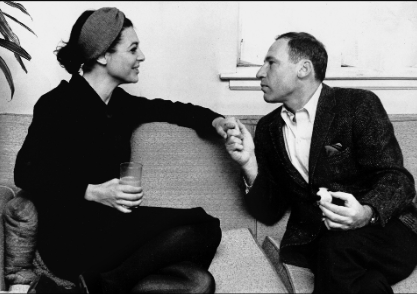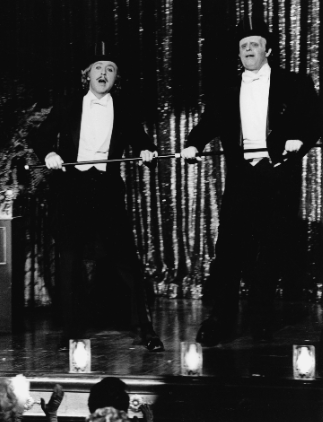Mel Brooks’ “All About Me!” is a triumph — especially as an audiobook

If you love Mel Brooks, you’ll love his new autobiography All About Me!: My Remarkable Life in Show Business. If you don’t love Mel Brooks, forget it, you’ll hate it.
Here’s the deal with this book. Mel Brooks is an egomaniac. Mel Brooks thinks Mel Brooks is the greatest thing ever. Yes, it’s a joke and he’s in on the joke — if he’s going to write an autobiography, there will be no false modesty in it. He wants you to know that not only did he write great TV, make great movies, and create a bona fide Broadway hit, but that he had a blast while doing it. This book is about how he did it.
If you care about what he created, you’ll love to hear this . . . even though it is a bit over the top.
Why listen to this book on audio?
I’ve just begun listening to audiobooks. (Before last year, I had, literally, narrated more audiobooks — the four I had coauthored — than I had listened to.) But the long drives back and forth between my old house in the Boston suburbs and my new home in Maine; visits to my grown children in Worcester and Amherst, Mass.; and time spent walking for exercise gave me an excuse. And I know what I like.
In my fantasy, the audiobook of All About Me! includes actual audio from Brooks’ TV shows, comedy albums, movies, stage musicals, and award acceptance speeches. Having listened to Malcolm Gladwell’s audiobook about Paul Simon, I’ve become spoiled; when I read a book about an artist, I want to hear clips from that artist’s work. Regrettably, that material is not part of All About Me! (the rights would probably have been arduous to clear).
Instead, the whole audiobook is Mel Brooks reading.
But he does that so much better than anyone else could with this material. He is an actor — you can hear his pride, enthusiasm, love, and sorrow coming through as he narrates his own life. His immediately recognizable scratchy Brooklyn accent adds a layer of authenticity that would be sadly lost if an actor read this. (Larry David could have given it a shot.)
So if you are going to experience this book, listen to it, don’t read it. The print edition and the ebook include some photos. Those are nice. But even though the audio lacks those photos, it’s a far more vivid experience.
What do you actually get in this book?
Brooks background is a lot less famous than his output. His father died when he was two, and his mother and three brothers had to scrape by on very little money. Rather than end up in the garment industry like all the other jews in his neighborhood, Brooks realized he was destined for show business — as soon as he heard Ethel Merman on Broadway in Cole Porter’s “Anything Goes.” His first experience was bombing as a fill-in comic in the Borscht Belt, where his regular job was as a busboy.

After some misadventures as a GI in World War II, including driving a truck so poorly that he demolished the corner of a building, Brooks weaseled his way into the good graces of the comic Sid Caesar, who eventually got him a job as a comedy writer on the popular variety series Your Show of Shows. Brooks takes us inside the high-stress low-pay sweatshop that was the comedy writing room. He met the actress Anne Bancroft and then, effectively, hit up all her friends and stalked her to parties and gatherings all over New York. Eventually she said “If you want to see me why don’t you be brave and ask me for a date?” So he did, and a long romance began.
After that came the TV spy spoof “Get Smart,” and the movie The Producers (original title: Springtime for Hitler) — about crooked producers who raise money for a show about the führer, knowing it will be a flop and they’ll keep the investors money. Brooks knew he was a writer, but he needed a Broadway song. Who could he get to write “Springtime for Hitler?” Bancroft sent him into a room with a blank piece of paper and told him to write it himself. And, as Brooks quips, just one hour and month later, he had written the song. He got the backers to allow him to direct and created a movie full of stuff sure to offend any audience, including his own producers, who were almost afraid to release it. But with a rave review from Peter Sellers, The Producers opened to crowds and laughter in 1967 and Brooks was off and running.

After this, Brooks created the movies that thrilled my adolescent friends and me, even though the theater wouldn’t let us into Blazing Saddles because it was rated R. The book’s behind the scenes descriptions of how Brooks violated every rule of cinema to create Blazing Saddles, Young Frankenstein, and Silent Movie are fascinating. (Somehow, Brooks managed to get access to the original laboratory props from the Frankenstein movies, which is one reason why Young Frankenstein looks so authentic.) Each of these spoofs was crafted with loving attention to the genres they lampoon. He even got Hitchcock’s permission, and eventual endorsement, to create his take-off High Anxiety.
Brooks started his own production company to produce serious movies like The Elephant Man, My Favorite Year, Frances (the Frances Farmer story), 84 Charing Cross Road, and The Fly.
And in 2001, with the help of a cadre of Broadway professionals including his director and choreographer Susan Strohman, the Broadway musical The Producers musical opened to wide acclaim and, eventually, won 12 Tony Awards, a record that has never been broken. (In his acceptance speech at the Tonys, Brooks said “I’d like to thank Stephen Sondheim for not releasing a musical this year.”) While moviemaking is a well-trod topic, the inside story of what it takes to create a musical production is not. Brooks’ behind-the-scenes narrative of how a movie turned into hit musical with a dozen songs was fascinating.
Mel Brooks really wants you to know that what you imagine to be a talent for vulgar jokes and bathroom humor is something more. He doesn’t spare the self-praise in describing the awards he won, including, towards the end of his career, the Kennedy Center Honors, presented by Barack and Michelle Obama, and the American Film Institute’s Life Achievement Award. And he certainly wants you to know that he is in very select group of individuals who have received an EGOT (Emmy, Grammy, Oscar, and Tony), for respectively, writing a Sid Caesar variety special; recording the comedy album; writing the original screenplay for The Producers movie; and writing the book and score for “The Producers” on Broadway.
The constant patting of his own back does become tedious at times, as does his description of so many of his collaborators — all his “very good friends” — as incredibly talented and if they’re female, also beautiful. He lavishes praise on some of his movies that weren’t nearly as successful, like Robin Hood: Men in Tights and Dracula: Dead and Loving It. Mel Brooks is an old school guy and his admiration for women as collaborators is of course matched by a leering appreciate for women as sex objects. He is a man who has lived a very rich and fulfilled life based, not just on a supreme talent for farce and ridiculing cinema clichés, but also on honing the craft of making entertainment and surrounding himself with actors and other professionals with the best possible skills.
The bottom line is, if you like Brooks — if you find him more entertaining than offensive, and more talented than egomaniacal — you ought to buy All About Me! And if you can spare the time, listen to the audiobook. It’s so much more entertaining to hear about Mel Brooks’ life straight from the jester’s mouth.
Do you know if this is only available through Audible? I don’t see a hardcopy of the audiobook.
Everyone is saying to listen to the master.
These days most audio is by download. I don’t know any other way to get it.
TY. I don’t see another option. Technology takes us a mile back.
I was a huge fan of “Your Show of Shows” and I almost died laughing listening to the “2013 Old man” album, but to say I was disappointed in “All of Me” is the understatement of the century. Nonstop bullshit of one success after another. No editingg. The guy just spewed his schtick into a recorder and the Ballantyne people printed it verbatim, including horrors like “I called the late Hugh Hefner” (how did you know his telephone number in the afterworld?) and absolutely no laughs that I hadn’t already heard..